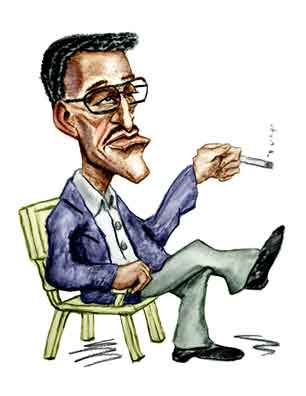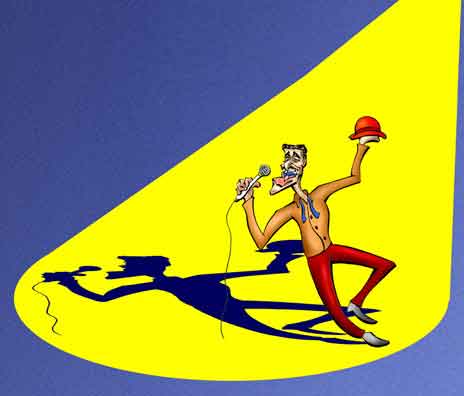Given the Great Criticism that the earlier portraits of the iconic entertainer Sammy Davis, Jr., have elicited, perhaps another rendition can serve as an artist's response to just criticism.
Previous Portraits

#1

#2
Given the Great Criticism that the earlier portraits of the iconic entertainer Sammy Davis, Jr., have elicited, perhaps another rendition can serve as an artist's response to just criticism.
Previous Portraits

#1

#2
Sammy's dad, Sammy Davis, Sr., was an expert dancer and he married Elvera Sanchez in 1923. Sammy, Jr., was born in 1925 and soon Sammy, Sr., and Elvera found that being performers and married and parents wasn't easy. So they separated and it was decided that Sammy, Jr., would travel with his dad.
However, Sammy, Sr.'s mother, Rose, didn't think a traveling theatrical troupe was a proper environment for a three-year old. So she insisted her son bring Sammy, Jr., to live with her.
But Sammy, Sr., didn't want to be separated from his son and so he quit show business. Of course, the available jobs were low level and the pay was likewise low. He was getting increasingly frustrated until he saw young Sammy doing some dance steps, no doubt having picked it up watching the dancers in his dad's shows. Sammy, Sr., finally convinced his mom to let him make Sammy part of his act. Although Rose wasn't thrilled with the idea, she understood that show business offered a way out from the dead end jobs for both her son and grandson.
Naturally there were some difficulties in having a kid in a traveling theatrical troupe. For one thing formal schooling was nigh on impossible. However, Sammy, Sr., did his best to find private tutors and Sammy grew up to be literate and clearly had high intelligence. The troupe pretty much took Sammy under their collective wings and so he was raised in an environment of close if not altogether typical supervision.
By the time Sammy was four he was dancing well enough to appear on stage. Sammy, Sr., was part of a song and dance group called the Will Mastin Trio and the young Sammy would sometimes perform with them. Within a couple of years Sammy was taking lead parts in the show so it's no surprise that Sammy soon moved into that new fangled entertainment called cinema.
The famous film clip you see of a very young Sammy was from Rufus Jones for President, a 1933 short film about a young black kid who gets elected president. So Sammy was not only appearing in films but was a star by the time he was seven.
Sammy, though, didn't get top billing. That honor went to Ethel Waters who was then the #1 black entertainer in the country. Sammy, though, was at least listed first in the list of the other actors.
The story starts out with young Rufus (Sammy) being bullied by a neighbor. His mother (Ethel) holds him in her arms as she comforts and sings to him. Rufus thinks his problems would be over if he was President of the United States.
Suddenly all the friends and neighbors show up with a marching band and banners blaring support for Rufus Jones for President. From there on the plot takes off and given that constitutionally a seven year old has to wait 28 years to be eligible for the Presidency it doesn't take much to figure out how the movie ends.
Given the year the movie was released - not to mention that the production team was all white - it should be no surprise that there is scarcely a stereotype left out. At the end of the show the viewer gets the uneasy feeling that the writers and producers have a sugar coated but hardly benign message for the intended audience, again a message that's no surprise given the film's vintage.
The plus side is the movie is technically well made and the music - including three songs by Ethel - are about as good as you can get. Ethel really could sing. Sammy also gets to show off his dancing and singing skills.
Sammy went into the army during World War II and by the mid-1950's, he was one of the top performers in Hollywood as a singer, dancer, and movie star. He really gained fame once he became one of the famed Rat Pack along with Frank Sinatra, Joey Bishop, Peter Lawford, and Dean Martin. Sammy appeared in the movies Ocean's 11, Robin and the 7 Hoods, Salt and Pepper, and as Sportin' Life in the movie version of Porgy and Bess.
Of course, Sammy appeared on television. He was the Mystery Guest on What's My Line five times (!), and he had major guest roles in 77 Sunset Strip, The Rifleman, Ben Casey, The Wild Wild West (with co-guest star Peter Lawford), Batman, The Beverly Hillbillies, and The Mod Squad where in one of his three appearances he played a priest who had heard the confession of a bad guy (Robert Duvall) who had been pardoned and now thought Sammy was going to spill the beans.
One show that is often omitted from Sammy's filmography was when he, Frank Sinatra, and Trini Lopez appeared on the kids' show hosted by Soupy Sales. Soupy's program was presented on multiple levels. Older kids and even adults liked the show, not the least reason being that Soupy had non-kid celebrities as guests. And this was long before the double tiered scripts became standard fare on shows like Sesame Street.
In this episode, Soupy was the maitre-d' of the Chez Bippy Restaurant and Frank, Sammy, and Trini came in. After some self-satirizing repartee between Soupy and Frank, Frank complained to Sammy that he had been picking on him all the way down there. He said that in a sneak preview of Von Ryan's Express (largely regarded as one of Frank's better movies) the audience cheered and whistled and hollered.
"What happened?" asked Sammy, "Did the reel break?"
"No, the reel didn't break," retorted Frank. "Because I saved two girls in the picture."
"Yeah." Sammy turned to Trini. "One for the producer and one for himself."
"Is there any soup on the menu?" asked Trini.
"Yeah," replied Soupy, "but we wiped it off."
Soupy brought Sammy some frogs' legs.
"Hold it," said Sammy, "one of the these frogs' legs are shorter than the other."
"What do you want, buddy?" asked Soupy. "You want to eat it or dance with it?"
But for those who remember Soupy's show, you can guess the final outcome. Yes, by the time the skit was over, everyone ended up with a pie in the face.
References and Further Reading
"I Can Do Anything": The Sammy Davis, Jr. Story", William Schoell, Avisson Press, 2004.
Rufus Jones for President, Ethel Waters (actor), Sammy Davis, Jr. (actor), Roy Mack (director), A. Dorian Otvos (writer), Cyrus Wood (writer), Vitaphone, Warner Brothers, 1933.